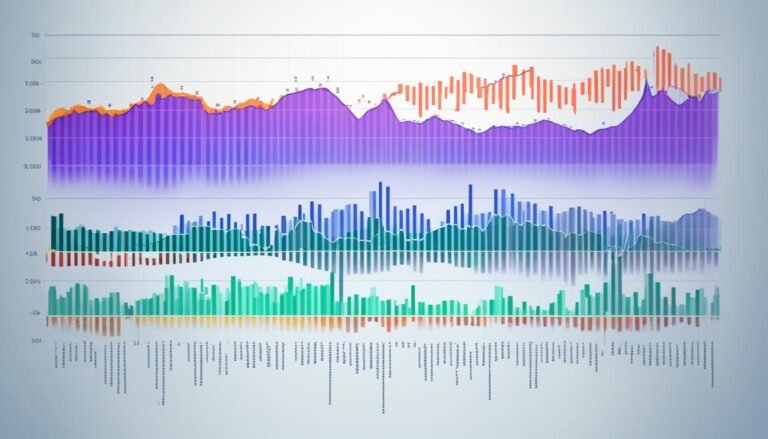Blockchain Technology in Finance: Transforming Traditional Systems
The global blockchain market could hit $69 billion by 2026. This shows it’s not just a trend, but a big change in how we do finance. At its heart, blockchain offers better security, clearer transactions, and more efficiency.
The financial world is moving fast. To keep up, tech improvements are a must. Big names like JPMorgan Chase and newer players like Ripple use blockchain to do things better. They’re not just upgrading. They’re changing how we do money worldwide. This shift marks a new chapter where older ways keep getting better.
Key Takeaways
- Blockchain technology is on track to revolutionize the finance sector with a market worth projected to reach $69 billion by 2026.
- Digital ledger systems offer unparalleled security and efficiency in managing financial transactions.
- Leading financial firms and fintech startups are adopting blockchain to gain a competitive edge.
- Blockchain technology promises to transform traditional financial systems by enhancing transparency.
- Financial technology advancements are essential for firms to stay competitive in the evolving landscape.
Introduction to Blockchain Technology
Blockchain technology is changing how we handle data and transactions. It uses a decentralized model that deletes the need for middlemen. This improves both the speed and safety of deals. Encrypted data keeps information safe from tampering.
What is Blockchain?
Blockchain is like a massive diary where every deal is written down by many people. Watching over each other, they can’t easily cheat. Once added, encrypting each deal makes changing things almost impossible.
How Blockchain Works
So, how does blockchain do all this? It starts by adding new data as blocks. Then, computers in the network check and agree the data is good. After it’s confirmed, the new block gets securely added to the chain. This creates a strong and unchangeable record.
Distributed Ledger Technology in Finance
Distributed Ledger Technology (DLT) is changing how finance works. It lets blockchain track transactions openly and without a boss. This brings better times in finance, like cutting cost, speeding up deals, and fighting fraud better. So, what makes DLT tick and why does it matter?
Core Principles of Distributed Ledger Technology
DLT’s strength comes from its core ideas:
- Decentralization: There’s no single boss in DLT. Transactions are shared across many places. This adds muscle to the system and makes deals clearer.
- Immutability: Once something’s written into DLT, it can’t be changed. This trusty feature keeps financial records solid.
- Consensus Mechanisms: DLT uses ways like Proof of Work (PoW) to agree on transactions. These ways make sure the shared data is spot on and protected.
Benefits in Financial Services
Using DLT in finance has many pluses:
- Cost Efficiency: DLT makes deals cheaper by cutting out the middle folks.
- Faster Settlements: Now, transactions wrap up real fast, not in days like before.
- Fraud Reduction: DLT makes it harder to cheat by showing transactions to everyone and locking them when set.
| Principle | Advantages |
|---|---|
| Decentralization | Increases resilience and ensures transparency |
| Immutability | Enhances data integrity and trustworthiness |
| Consensus Mechanisms | Validates and secures transactions |
Blockchain Technology in Finance: Transforming Traditional Systems
Blockchain tech is changing the financial sector from the ground up. It introduces new ideas, makes things run smoother, and lowers costs. With this tech, banks and other financial companies can make transactions safe and instant. They can also make global payments easier.
In the past, money moving around would hit many bumps, cost more, and take longer. But now, blockchain changes all that by working without a central hub, making processes clear as day. It brings people closing together, which builds more trust.
Blockchain shines bright when it comes to clearing up who owes what and settling debt. The old ways were slow and needed much checking. But with blockchain, things update on their own, speeding up the whole process. This means deals get done faster and without mistakes.
The finance world is jumping on the blockchain train, showing its power to make big changes. More and more, banks and such are using this tech to shake up how they work, get more done, and spend less in the process. This proves innovation’s worth in finance.
Blockchain’s journey is just beginning, and the road ahead looks full of smart solutions. These could make global payments even better or make settling up a real snap. Blockchain leads the pack in making finance work better and smoother for everyone.
Cryptocurrency and Its Financial Impact
Cryptocurrencies like Bitcoin and Ethereum use blockchain technology. They change how we see and do digital assets and financial deals all over the world.
Introduction to Cryptocurrency
Cryptocurrencies are digital and decentralized. They aim to make financial transactions safe and clear. They use strong technology to keep transactions safe from fraud.
Bitcoin and others have made people more confident about using digital money. They see it as a real choice against the traditional money systems.
Cryptocurrency in the Financial Ecosystem
The finance world is now feeling the effects of cryptocurrency. Big players are looking at it as a way to grow their portfolios. This can lead to better earnings using new financial tools.
“The future of finance lies within the seamless integration of cryptocurrencies and traditional financial infrastructures, transforming the way we perceive and manage our assets.” – Expert Analysis
The world of digital currency is always changing. It’s changing how we do money deals and manage our wealth. The finance sector must keep up and keep getting better to meet these new demands.
Smart Contracts and Financial Transactions
Smart contracts are changing how we do financial deals. They use code to run agreements automatically. This cuts out the need for people to watch over the process.
What are Smart Contracts?
Smart contracts are like digital agreements. They live on blockchains, making them open and safe. They handle agreements by themselves, skipping old, slow ways.
Benefits of Smart Contracts in Finance
Smart contracts bring many pluses to finance. They make things work better and cheaper:
- Contract Automation: They automate deals, making things like loans faster and less likely to mess up.
- Self-Executing Agreements: These deals happen on their own, ensuring they are done right on time.
- Reduce Intermediaries: Fewer go-betweens mean deals cost less and trust grows.
They’re changing how we do lots of money stuff, like:
- Loans: Making loans and payments automatic saves time and cuts risks.
- Insurances: They make getting and using insurance easier and clearer.
- Compliance: They keep up with rules on their own, staying legal.
| Financial Process | Traditional Method | Smart Contract Implementation |
|---|---|---|
| Loans | Manual Processing, High Risk of Error | Automated Disbursements, Reduced Default Risk |
| Insurances | Lengthy Claims Processing | Faster, Transparent Claims Settlements |
| Compliance | Manual Adherence to Regulations | Automated Legal Updation and Adherence |
Smart contracts are making finance better. They automate deals, making them run smoothly without many hands involved. This makes things cheaper and simpler in the financial world.
Decentralized Finance (DeFi) Innovations
Decentralized Finance (DeFi) has transformed finance using blockchain. It cuts out the middlemen, such as banks and brokerages. This change makes financial services available to more people.
Overview of DeFi
DeFi changes how financial systems work by using decentralized protocols. It aims to be open to all, without needing permission, and transparent. This gives individuals more control over their finances, bypassing central authorities.
Blockchain makes these changes possible by offering efficiency, lower costs, and better security. This new financial model has a deep impact.
Key DeFi Applications
Several important DeFi applications are shaping the field:
- Lending Platforms: Through platforms like Aave and Compound, users can directly lend or borrow cryptocurrencies with smart contracts. This ensures safe, direct transactions.
- Decentralized Exchanges (DEXs): Uniswap and SushiSwap allow direct peer-to-peer trades. They help make finance more open and reduce the risk of central control.
- Yield Farming Opportunities: Yield farming lets users earn rewards through providing liquidity to DeFi protocols. This encourages more people to get involved.
The DeFi sector keeps growing with new and innovative protocols. As it expands, finance is becoming more open and clear for everyone.
| Application | Function | Examples |
|---|---|---|
| Lending Platforms | Enable peer-to-peer borrowing and lending | Aave, Compound |
| Decentralized Exchanges (DEXs) | Allow trading of digital assets without intermediaries | Uniswap, SushiSwap |
| Yield Farming | Earn rewards by providing liquidity | Yearn.finance, Curve Finance |
The Role of Digital Assets
Digital assets are changing how the financial world works. They include more than just cryptocurrencies. Now, digital assets cover a wide range of forms like tokenized real things, digital stocks, and tokens for specific uses.
Types of Digital Assets
Let’s look at the various digital assets available:
- Cryptocurrencies: These are common types, like Bitcoin and Ethereum.
- Asset Tokenization: It turns physical assets, such as real estate or art, into digital tokens.
- Digital Securities: These are like digital versions of traditional financial items, making trading easier and cheaper.
- Utility Tokens: They allow entrance to certain services or products within a certain blockchain system.
Impact on Traditional Financial Systems
Digital assets are shaking up how we invest and the finance world as a whole. The change is big, affecting many parts:
| Aspect | Traditional Systems | Digital Assets’ Impact |
|---|---|---|
| Investment Channels | It usually focused on things like stocks and bonds. | Now, it’s getting broader with the introduction of asset tokenization and digital securities. |
| Liquidity | It was held back by when the markets were open and laws. | Access to assets is easier with markets open around the clock and fewer costs. |
| Operational Efficiency | There was a lot of go-between and slow actions. | Things are speeding up and getting clearer thanks to blockchain. |
Digital assets are setting up a more open, efficient, and lively future for finance.
Enhancing Financial Inclusion
Blockchain technology brings new hope for financial inclusion worldwide. It makes banking more accessible, letting everyone, including those without bank accounts, join in. This leads to better economic strength and growth in places with less banking access.
Blockchain for the Unbanked
The unbanked face many hurdles, like high fees and lack of services. Blockchain jumps these hurdles with its decentralized systems. It opens doors to banking for those cut off from traditional banks, helping to improve their lives.
Case Studies
In Africa, BitPesa uses blockchain for affordable, worldwide payments. These efforts support small businesses and boost economic growth. In Southeast Asia, OmiseGO’s blockchain work allows more people to make secure transactions, even without bank accounts.
These real stories highlight how blockchain can improve financial access by reducing costs and improving services. They show blockchain’s power in creating a fairer financial world.
Ensuring Secure Transactions
Security and trust are key in financial dealings today, especially with blockchain. Data integrity is a major blockchain advantage. It records every transaction in a secure, unchangeable way.
Blockchain uses strong encryption to fight off fraud. It makes sure only the right people can see transaction details. This protection keeps user information safe from harm.
Moreover, everyone must confirm the information on the blockchain. So, it’s hard for frauds to get away with it. This makes secure payment systems trustworthy for everyone.
| Blockchain Feature | Benefit |
|---|---|
| Data Encryption | Ensures confidentiality and data integrity. |
| Consensus Mechanisms | Prevents fraudulent activities. |
| Immutable Ledger | Maintains accurate and tamper-proof records. |
With blockchain, banks and other financial bodies can offer very safe secure payment systems. Every transaction is done safely, building trust with everyone involved.
Promoting Transparency in Financial Systems
Blockchain technology has changed the game in financial systems. It’s pushing for more clear and open money processes. By working within finance, it raises the bar for how clear and responsible the sector is.
The key idea here is audit trails that can’t be changed. Using a decentralized system, every deal is locked in a way that can’t be altered. This means all money actions can be followed and proven. Such a high level of clarity makes people trust the money world more. It also proves the promise to act ethically.
The amazing changes that have happened are clear in the table. It shows how using blockchain in money systems boosts clarity and responsibility:
| Traditional Financial Systems | Blockchain-Enabled Systems |
|---|---|
| Centralized record keeping | Decentralized ledger |
| Limited transparency | Transparent financial processes |
| Susceptible to fraud | Secure and immutable audit trails |
| Retroactive compliance checks | Real-time regulatory compliance |
Adding blockchain into finance paves the way for better and fair ways to handle cash. It provides unchangeable records and ongoing clarity. This helps financial groups make sure they operate in a way that’s dependable, clear, and stands for good practices.
Blockchain tech is more than a buzz; it’s changing the game to create a fairer money world. It encourages clear financial steps and helps build trust.
Regulatory Compliance and Challenges
The use of blockchain in finance forms compliance challenges that change as new laws emerge. Around the world, regulators are working on rules. These rules aim to keep financial systems safe while allowing blockchain’s benefits.
Regulatory Landscape
The rules around blockchain are quickly evolving, with each place having its own way. The European Union and the United States are at the forefront of making rules. These rules need to support both progress and safety when using blockchain for finance.
Challenges in Blockchain Regulation
Complying with the law while not limiting innovation poses a big challenge in blockchain. This means everyone, from regulators to people in the industry, has to find a way. They have to work with complex rules to encourage new ideas while keeping things safe. Issues like protecting data, dealing with transactions that go across borders, and stopping money laundering are key areas.
Conclusion
Blockchain has caused a big change in finance. Its secure, clear, and efficient nature makes it stand out. More and more, finance is using blockchain’s benefits.
Blockchain is changing finance a lot. It is making finance more open and fair. This means anyone, even the unbanked, can do safer and quicker deals everywhere.
Yet, blockchain faces issues like rules and new tech problems. But, its growth shows a bright future. Finance is moving to be more flexible and strong. This will make finance work better for everyone.








